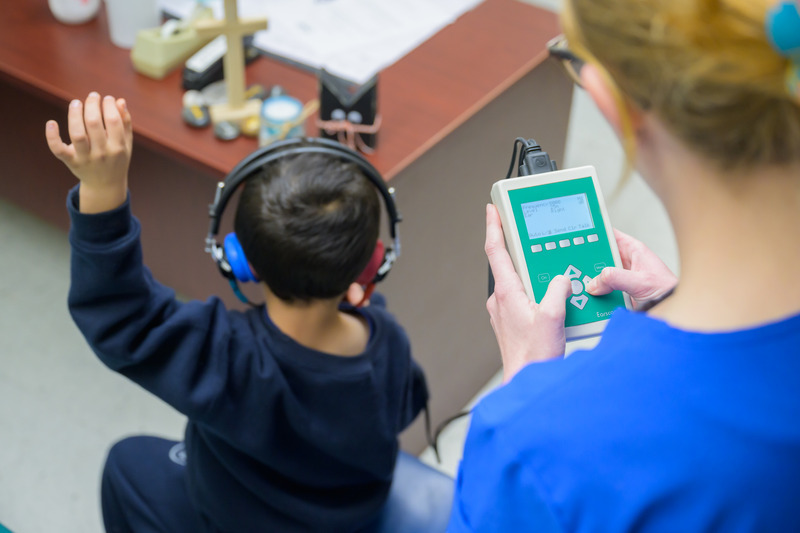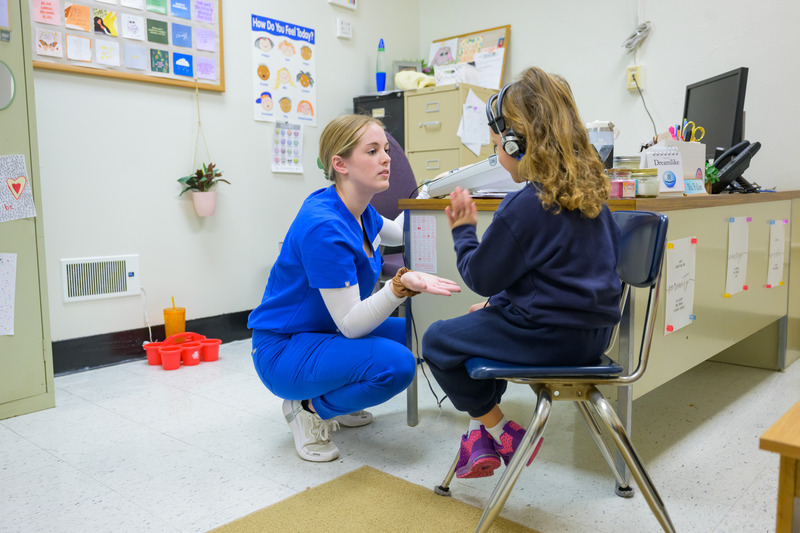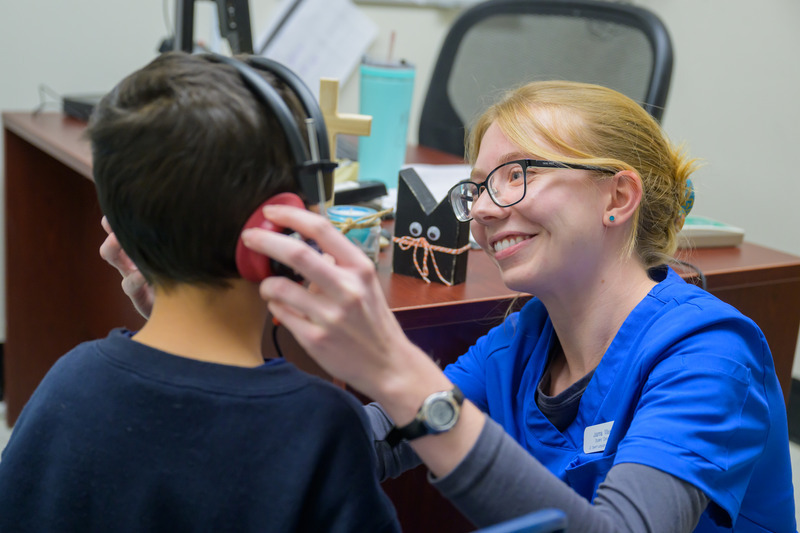


Vital hearing screenings
Photos by Evan Krape January 04, 2024
UD speech-language pathology students conduct hearing screenings in Delaware schools
When she was 5 years old, Lexie Maxwell remembers sitting in a hard plastic chair, wearing a pair of oversized headphones in the nurse’s office at Holy Angels School in Newark and raising her hand whenever she heard a relatively quiet beep.
These beeps were difficult to perceive because she suffered from chronic ear infections as a child, which caused temporary hearing loss. Further, Maxwell had several sets of pressure equalization tubes, which ultimately caused high-frequency hearing loss due to high scar tissue on both eardrums. This led her to fall behind in speech and language. As a result, Maxwell would return to that very same room at Holy Angels weekly for speech therapy and reading comprehension sessions in third and fourth grades.
“I distinctly remember getting pulled out of class, and I loved it,” Maxwell said. “Not only did I always return with candy, but it was so fun. I didn’t realize it was speech therapy until I became interested in the career in high school.”
Now, in a full circle moment, the University of Delaware graduate student is conducting those same baseline hearing screenings on children at Holy Angels as part of her coursework to obtain her master’s degree in speech-language pathology.
“The room hasn’t changed a bit,” she laughed.
But her knowledge has increased vastly since then.
“These hearing screenings are so important. I know first-hand,” Maxwell said. “Hearing is often overlooked and not the first thing people think of when a child falls behind in school.”
Maxwell and other graduate students work with Jody Eddy, audiologist and clinical educator in UD’s Speech-Language-Hearing (SLH) Clinic to learn state-of-the-art techniques to screen hearing in young children. Through her leadership, Eddy has forged connections with local private, parochial, and charter schools to assist school nurses in conducting state-mandated hearing screenings for students in kindergarten and second, fourth and seventh grades in a win-win partnership that also gives graduate students the required clinical experience.

“We can hammer out three to four screenings in the time it takes a school nurse to do one,” Eddy said. “If we can get a third of hearing screenings done over a few days, the school nurse can return to caring for sick children.”
Laurie McGrellis, in her ninth year as school nurse at Holy Angels, said completing the hearing screenings without UD’s help would be a massive and time-consuming undertaking.
“The bottom line is if a student can hear, they can learn better,” McGrellis said. “These screenings are vital, and it’s so beneficial and helpful that UD gives back to the community in this way.”
Eddy led Delaware’s Newborn Hearing Screening Program for years and founded ChristianaCare’s newborn hearing screening program.
“Delaware screens 98% of newborns, but the follow-up hinges on parents, and that’s where we see kids falling through the cracks,” Eddy said.
If a child passes the newborn hearing screening, they typically won’t be screened again until kindergarten. By then, a child could have difficulty with speech and language due to lessened ability to perceive their input language.
“There could be progressive hearing loss or late-onset hearing loss that’s gone undetected for five years,” Eddy said. “That five-year period is crucial to speech development.”
Eddy works alongside graduate students, educating them on properly conducting hearing screenings.
“As budding speech pathologists, they need to understand the value of hearing to language acquisition,” Eddy said. “I always drive home that anytime you see a pediatric client with a language or speech articulation delay, their first question should be — when was the last time they had their hearing checked?”
Eddy stressed that early intervention is crucial in these scenarios.
“The data has shown that speech is vastly different and more progressed in a child who has received early intervention versus a child with a similar hearing loss that went undetected,” Eddy said.
UD currently works with several private, parochial, and charter schools from Wilmington to Dover but would like to expand hearing screening services in southern Delaware.
“It’s a niche that requires special equipment and a special skill set,” Eddy said. “There’s a lack of pediatric audiologists downstate, and we at UD are doing what we can to meet the need.”
Jacquie Robinson, director of clinical education for the Department of Communication Sciences and Disorders, highlighted the growing need for hearing to be assessed and considered for all Delawareans, both old and young, and would love to see the program expand.
“There are many children who have hearing loss due to ear infections, viruses or other factors during the period of development between the newborn hearing screen and school age,” Robinson said. “However, these children are often not getting screened and often do not show observable signs of their hearing loss, especially when it is only in one ear. Even though these losses seem subtle, they can have profound effects on language development during this crucial period of language growth.
“We are committed to working towards more comprehensive and age-appropriate screenings for children in this age range. We are working towards providing more screenings through outreach efforts, but also invite caregivers to bring their children into the UD SLH Clinic for screenings.”
These screenings are also a valuable experiential learning opportunity for graduate students.
“For first-year graduate students, this is where the rubber meets the road,” Eddy said. “Opportunities like this to conduct baseline hearing screenings for elementary school students help prepare students more than any other speech-language pathology program that I’m familiar with, which makes UD’s program within the College of Health Sciences stand out.”
The opportunity has been enriching for Maxwell, who also obtained her undergraduate degree in cognitive science, specializing in pre-professional speech-language pathology at UD.
“These experiential learning opportunities allow us to see various conditions early on that prepare us for the future,” Maxwell said. “If there’s ever an issue, Jody treats it like a learning opportunity.”
Eddy always stresses:
“Do not let a student leave the room if they’re not passing. Sometimes, it’s a teaching moment, where we’ll troubleshoot and figure out headphone placement wasn’t quite right,” Eddy said. “We’ll also check for wax in the ears or an ear infection, which can create a different kind of hearing loss. They learn these subtle innuendos that could cause failures in certain frequency ranges.”

Joanna Maier, also a first-year master’s student in the speech-language pathology program, said she learned so much from conducting hearing screenings. She didn’t have prior speech pathology experience.
“Practice makes a difference, and I’ve refined my skills,” she said. “I also haven’t had an audiology course yet, and so the concepts, the materials, and the machines are completely new to me, and having this repeat experience brings familiarity and raises my comfort level, which makes a huge difference.”
Maier did have prior experience working with children with special needs; she worked as an aide in an autistic support classroom at a school in Philadelphia.
“I was paired with a kindergartner with autism who was non-verbal,” she said. “Working with him and watching his speech therapy sessions inspired me to pursue my master’s in speech-language pathology.”
Through her own first-hand experiences, she’s also learned the value of baseline hearing screenings.
“Hearing is such an important piece of a person’s overall health, and it’s associated with so many different communication skills,” Maier said.
She pointed out, “How will you respond in class if you can't hear? How will you develop sounds the way you should? All these pieces connect to form interactions with others and our environment.”
Maier also touted Eddy as a resource and a fantastic educator.
“Everything I know has come from Jody,” Maier said. “She’s a great model on how to interact with students. It’s so different learning material in the classroom and applying the knowledge in a school setting. There have been so many instances where I learned the concept in class, but I learned so much more from interacting with a patient.”
Contact Us
Have a UDaily story idea?
Contact us at ocm@udel.edu
Members of the press
Contact us at 302-831-NEWS or visit the Media Relations website

